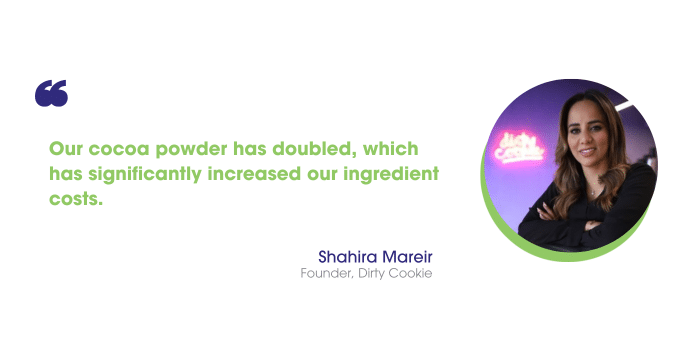Your child’s Easter basket may cost a lot more this year, especially if it’s brimming with chocolate bunnies and Cadbury Crème Eggs.
Cocoa prices have nearly doubled in 2024, Bloomberg reported, with wholesale bean prices in New York increasing more than 47% – or $8,900 a ton – in recent weeks.
- In fact, cocoa’s 186% gain over the last 12 months has surpassed bitcoin’s record-breaking 150% gain over the same period, according to Business Insider.
Several promotional products firms specializing in confectionary have been affected by the exorbitant cost of cocoa. “It has definitely impacted our business,” says Shahira Marei, founder of California-based supplier Dirty Cookie. “Our cocoa powder has doubled, which has significantly increased our ingredient costs.”

Meanwhile, Phoenix-based supplier Fairytale Brownies is one of the only companies in the United States that uses the quantity of raw cocoa liquor from Belgium that it does, typically bringing in close to 40,000 pounds at a time.
To secure another container for the fall, the company has to start looking at pricing in April in order to lock it in and receive the shipment on time, according to Kim Silva, operations team leader at Fairytale Brownies.
“It’s 14-16 weeks on the water, so timing is a big factor for us,” Silva says. “Fingers crossed the market softens. We can only wait so long. Prices have been going up steadily, but most drastically in the last two years, with our last purchase increase landing at 35% higher.”

What’s Causing The Increase?
Heavy rains in West Africa, where roughly three-fourths of the world’s cocoa is grown, have hindered production over the last six months, according to Bloomberg.
- Particularly, harvests in the Ivory Coast and Ghana, which produce nearly 60% of the global cocoa supply, have been lackluster.
Meanwhile, many processors aren’t able to afford the limited cocoa beans available, Reuters reported. As a result, there will be a deficit of 374,000 tons of cocoa this season, according to the International Cocoa Organisation (ICCO), which estimates that global cocoa production will drop 10.9% to 4.45 million metric tons this season.
The lack of cocoa will only exacerbate chocolate prices, which have been on the rise due to inflation.
- Last year, U.S. retailers charged 11.6% more for chocolate than in 2022, says Business Insider.
Executives from top chocolate manufacturers, such as Hershey, Cadbury, Mondelez International and Nestle, have already indicated that consumers may be faced with even more price hikes due to the cocoa shortage.
- 44% of American households say they buy chocolate or candy less often because of inflation, according to the U.S. National Confectioners Association.
Impact On Promo
Of course, higher chocolate prices won’t just hit the retail market.
Tom Riordan, president of Wisconsin-based Maple Ridge Farms, ranked the No. 46 supplier in the inaugural PPAI 100, has seen cocoa costs rise as much as 31%. “Of course, we won’t be able to raise our prices 30%-40%, but we’ll still have to raise them,” Riordan says.
The 45-year promo veteran says a friend of his, who has been in the chocolate manufacturing industry for years, believes the rising price of cocoa is being forced by traders and that the market will soften by the third and fourth quarter, ahead of the busy holiday season.

“My friend really feels it’s a temporary spike,” Riordan says. “It’s not going to give you a competitive disadvantage until someone decides to buy something other than a box of chocolate. I think we’re going to be okay, but I know our vendors have been beating on us to get our orders locked in.”
United Kingdom-based supplier Bite Promotions, which has been making chocolate for more than 30 years, has never experienced a cocoa price spike like this. “Not only us smaller manufacturers, but also the global giants like Cadbury, Mars and Nestle, will be forced to increase prices,” Michelle Wadley, director of Bite Promotions, told Sourcing City News.
Margaret Dengler, director of marketing at Midnite Snax, says the New York-based supplier has been working hard to minimize the impact to its business and customers. “As an example, we’ve met with the largest cocoa supplier in the world and have a pricing contract and plan in place,” Dengler says. “In addition, we’ve increased our efficiency and capacity by investing in more automation.”

David Miller, president of NC Custom, ranked the No. 18 supplier in the PPAI 100, says the New York-based firm is well situated to weather the current price increase.
“We locked in pricing via futures contracts prior to the sizable jump in cost,” Miller says. “Plus, we’re part of Nassau Candy, a much larger company that provides chocolate products in significant volume to other channels, such as retail. Both of these factors have enabled us to leverage our vendor relationships and minimize any impact to our customers.”


